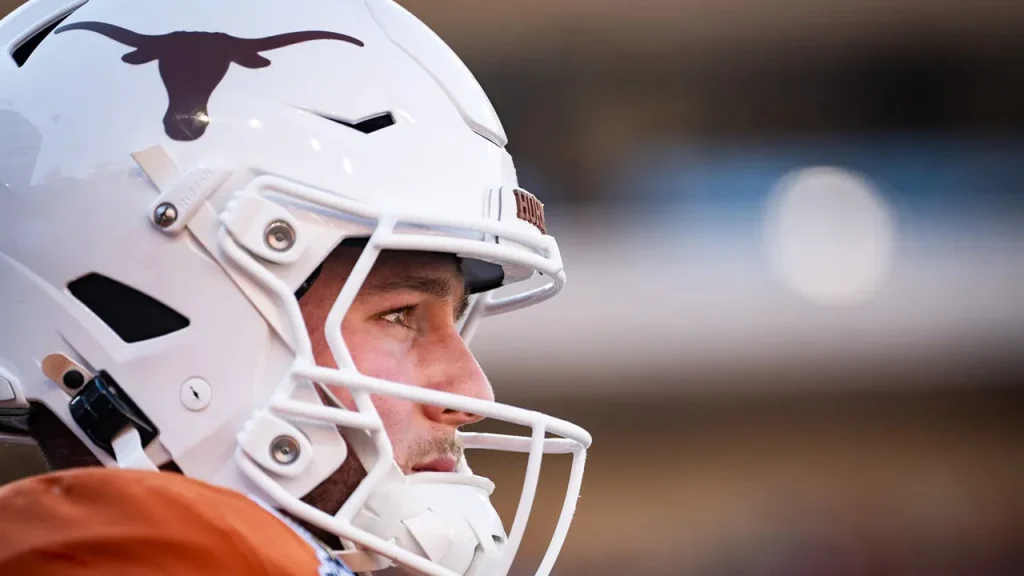Quinn Ewers, the starting quarterback for the Texas Longhorns, finds himself at a crossroads, facing a monumental decision that could reshape his future. With the allure of a lucrative $6 million offer to enter the transfer portal looming large, Ewers must weigh the immediate financial gains against the potential long-term benefits of remaining at Texas and pursuing a national championship, ultimately impacting his prospects for the 2025 NFL Draft. This substantial offer, the source of which remains undisclosed, adds another layer of intrigue to Texas’s playoff run, raising questions about Ewers’ commitment to the Longhorns and the stability of their quarterback room.
The timing of this offer, just days before Texas’s crucial College Football Playoff quarterfinal matchup against Arizona State, creates a potential distraction for both Ewers and the team. While Ewers has given no public indication of his intentions, the sheer magnitude of the offer – a sum rarely seen at the collegiate level – inevitably fuels speculation. This financial incentive to transfer presents a unique challenge for Ewers, forcing him to consider the immediate financial security versus the potential rewards of continued development at Texas, including a possible national title and the potential for increased draft stock. This dilemma highlights the evolving landscape of college athletics, where NIL deals and transfer portal opportunities are reshaping player decisions and team dynamics.
The uncertainty surrounding Ewers’ future also amplifies the significance of Arch Manning’s recent commitment to staying at Texas. Manning, a highly touted redshirt freshman and member of the renowned Manning football family, unequivocally dismissed rumors of his potential transfer, providing a sense of stability amidst the swirling speculation about Ewers. Manning’s decision to remain at Texas reinforces his commitment to the program and his desire to develop within the Longhorns’ system. This declaration of loyalty not only allays concerns about the team’s quarterback depth but also potentially influences Ewers’ decision, as it solidifies Manning as the likely successor should Ewers choose to depart.
Ewers’ journey to this pivotal moment has been marked by significant decisions and transitions. His initial commitment to Texas, subsequent decommitment to join Ohio State, and eventual return to the Longhorns demonstrate a willingness to explore different paths and seek opportunities that align with his ambitions. His limited playing time at Ohio State underscored the importance of finding the right fit, both in terms of playing time and overall program philosophy. Now, with a national championship within reach at Texas, Ewers must evaluate whether the substantial financial offer outweighs the potential benefits of seeing his collegiate career through with the Longhorns.
The potential implications of Ewers’ decision extend beyond his individual circumstances, impacting Texas’s championship aspirations and the broader landscape of college football. Should he choose to transfer, Texas would lose a quarterback who, despite battling injuries, has amassed impressive statistics this season. His departure would create a void at the most critical position, potentially derailing the Longhorns’ championship hopes and placing increased pressure on Manning to assume the starting role earlier than anticipated. Furthermore, Ewers’ decision could signal a shift in the college football landscape, where substantial NIL deals and transfer portal incentives increasingly influence player movement and disrupt team continuity.
The $6 million offer to Ewers represents a significant development in the ongoing evolution of college athletics. It highlights the increasing influence of NIL deals and the transfer portal, creating a complex and dynamic environment for both players and programs. For Ewers, the decision is a personal one, requiring him to weigh immediate financial gains against long-term career aspirations. For Texas, the outcome will significantly impact their championship pursuit and the future of their quarterback position. And for college football as a whole, Ewers’ choice will further illuminate the changing dynamics of the sport and the increasing power players hold in shaping their own destinies.










